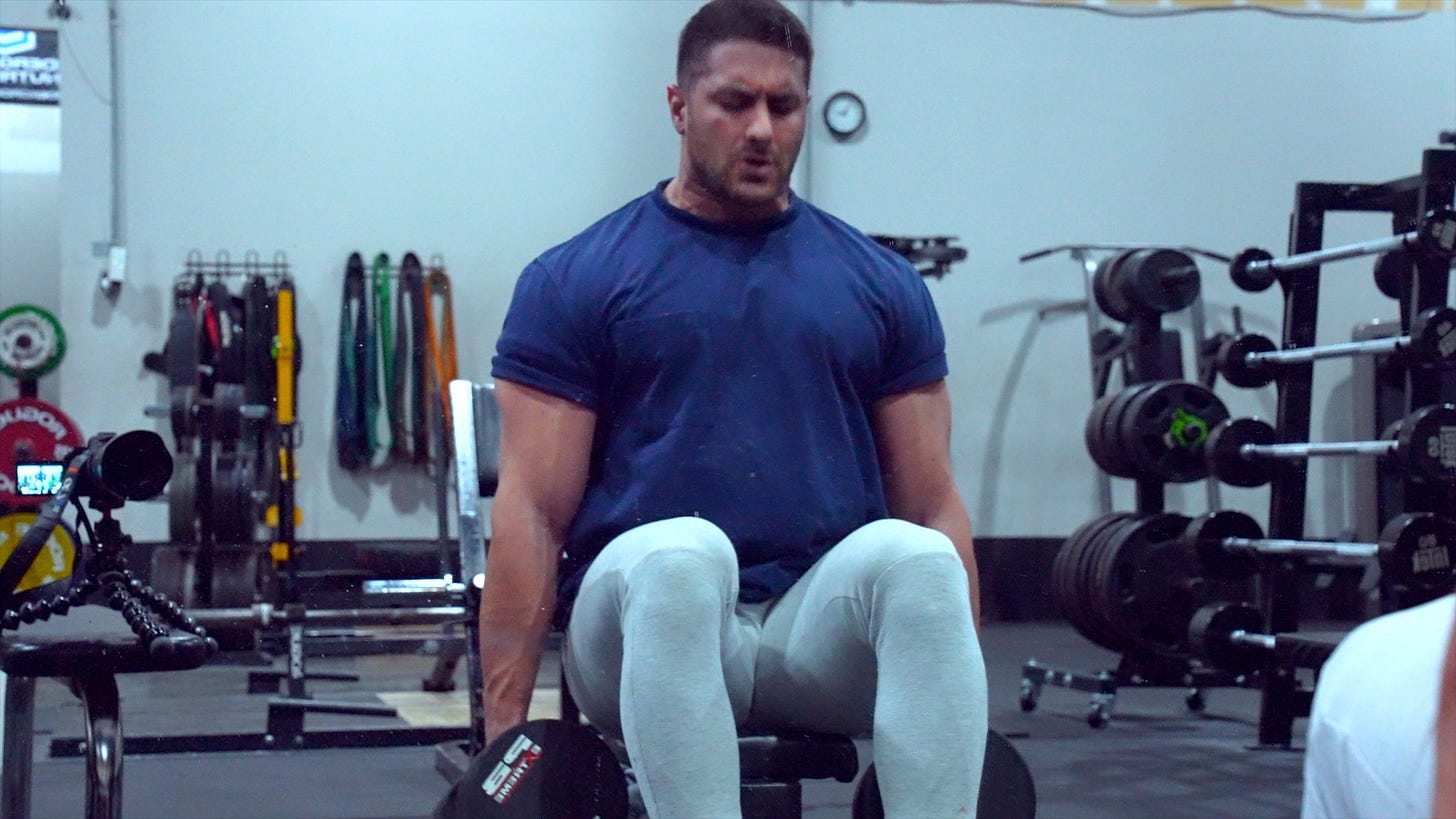How I Overcame Gym Anxiety
Conquering Gym Nerves through the Power of Gradual Exposure
Gym Anxiety
For those who don’t know me personally, it’s probably somewhat of a surprise to learn I’ve struggled with social anxiety, and by extension gym anxiety, for most of my time training in the gym. While I do not currently struggle with this issue anywhere near the level I used to, It’s still something that lingers in the background for me. In my attempt to talk about the issues that aren’t often covered by gym bros, I figured It was time to open up and give some advice on why gym anxiety can be so bad for your training and how to overcome it.
So some background before I begin. I recently signed up to what I call an “influencer gym”. For those of you who don’t know, some gyms attract young, very fit, social media minded gym goers because of some of the amenities, lighting, and posing rooms that make for great social media content. This is what I mean by “influencer gyms”.
Recently I’ve been going to the gym around peak hours which means it’s packed and everyone looks like they’re straight out of a Gym Shark photo shoot. Needless to say, it wasn’t the most comfortable atmosphere to train in. It was distracting to navigate through crowds of what look like fitness-models socializing and taking photos of themselves and each other flexing and posing into mirrors. My performance definitely suffered as well. I struggled to focus on the movements, my tempo was totally off and mind-muscle connection was non-existent until I made some corrections.
Fortunately for me, I have a ton of experience in the gym. Overcoming these kinds of obstacles wasn’t always as easy as it is today. What I’ve discovered as well is how common these experiences are for people. I’ve gotten to work with a number of members in Gaintrust who have expressed similar experiences with anxiety. It manifests itself in different ways per person but generally people experience feeling self-conscious about their bodies, overall intimidation by other gym-goers, or feeling like they don’t belong in the gym at all.
Tips through gradual exposure
Firstly, in order to overcome gym anxiety, it's important to understand that it's not something that can be "fixed" overnight. It takes time and effort to change negative thought patterns and build self-confidence. The key to all of this is through what is known as exposure therapy. Gradually exposing yourself to the things that trigger your anxiety in a controlled environment will be the main strategy in lowering gym anxiety.
These are some things I’ve found to help reduce anxiety and help me focus on my training.
Visit the gym during non peak hours
By visiting the gym during non-peak hours when it is less crowded, you get exposed to the gym environment in a less overwhelming way. This can make it easier for you to focus on the task of working out, rather than feeling self-conscious or anxious about being in the gym. Additionally, gradually increase the amount of time spent at the gym as you get more acclimate to the gym environment to build up confidence and overall comfort level.
Just type in the name of your gym + “hours” into google and you should see an image that looks like the above.
Headphones
This is one of the most obvious, but for good reason. Headphones, and especially noise cancelling headphones, are a great way to escape the calamity of a busy gym. They can also create a barrier between you and the people around you, making it easier to focus on your own workout and tune out any distractions. Plus, music can be a great way to get in the zone and improve your performance. It can be used to set the mood and pace that you want, and can also help to mask any uncomfortable sounds or interruptions in the gym. Additionally, using noise cancelling headphones can help to reduce ambient noise and make your workout environment more comfortable and secluded.
Mindfulness via Mind-muscle connection
This is a concept I talk a lot about because I think it’s THAT important. Mind-muscle connection is the technique of focusing your thoughts and energy on the specific muscles you are working during exercise. By actively engaging the mind to contract the muscle fibers, it can help to improve the quality of your workout, and also can help to reduce gym anxiety.By focusing on the muscle that you are working, you can shift your attention away from negative thoughts or anxiety-provoking situations, and bring your mind into the present moment. This can help to reduce the mental chatter and distractions that can contribute to gym anxiety.
To practice mind-muscle connection, you can start by focusing on the muscle group you are working, whether it be your biceps, triceps, or quads, and visualize the muscle contracting and relaxing. You can also try to focus on the specific movement you're performing, visualizing each rep as you perform it.It takes practice and patience to establish a mind-muscle connection and to make it a habit, but with time and practice, you will be able to improve your workout and reduce gym anxiety.
I’ve talked about this concept at length here.Follow a program
There is no worse fear than that of the unknown. Following a training program can be a great way to reduce anxiety in the gym. When you have a plan and know what you're going to do before you even step foot in the gym, it can help to reduce uncertainty and fear. Knowing what exercises you will be doing, the reps, and the sets can help you feel more prepared and confident, and less anxious.A training program will also help you to stay on track and to have a clear direction for your goals, which can help to give you a sense of purpose and motivation. If you are focused on what you are trying to achieve, you will be less likely to be sidetracked by self-doubt or distraction, which can contribute to gym anxiety
A well-designed program will take into account different factors such as your current fitness level, goals, equipment availability, and time constraints. Following a program that has been tailored to your needs will help you to feel like you're making progress, which can help to reduce anxiety by providing a sense of accomplishment and giving you a sense of control over your fitness journey.
Having a structure to follow can also help to reduce decision fatigue and make it easier to focus on what you're doing in the gym. With a plan, you don't have to spend time figuring out what exercises to do or how many sets or reps to do, which can be overwhelming and contribute to gym anxiety.
Special shoutout - Online communities
Online fitness communities can be a great way to overcome gym anxiety and stay motivated on your fitness journey. They provide a sense of community and support, which can be particularly helpful for those who may not have access to in-person workout groups or personal trainers. Many online fitness communities offer a variety of resources such as workout plans, nutrition advice, and instructional videos, as well as a platform for members to connect and share their progress and experiences. They also can be a great source of inspiration and accountability, as members can share their progress and challenges, and get encouragement and support from others going through similar experiences. Additionally, some online communities also have virtual/live classes which allow you to engage with people who can provide the guidance and support you need to stay on track. Check ours out today!
Workout Partners
Today, I could wear bright colors in flip-flops and crush a workout alone with no headphones, no problem. However, when I was younger and filled with anxiety in the gym, having a gym partners always me feel more at ease and by extension focused on the task at hand. Having someone to talk to or to spot you on certain exercises can help to keep your mind occupied, which can make the experience less anxiety-provoking.
Additionally, when you are with a partner during the gym exposure, you might be less likely to leave prematurely or avoid going altogether, which is a very important aspect of exposure therapy.
Concluding Thoughts
It is also important to give yourself a credit if things don't go as planned. I have left the gym many times feeling defeated by nervousness, frustration with how I’ve handled it, and like a failure. It’s all about recognizing that this is way more common than you think it is and that through gradual exposure and some of the hacks we’ve discussed, progress can be made.
Gym anxiety will prevent you from reaching your full potential in the gym. It takes time and effort to change negative thought patterns and build up a level of fortitude, but with the right strategies, you can overcome this issue and become a stronger, more mentally focused individual, in and out of the gym.




